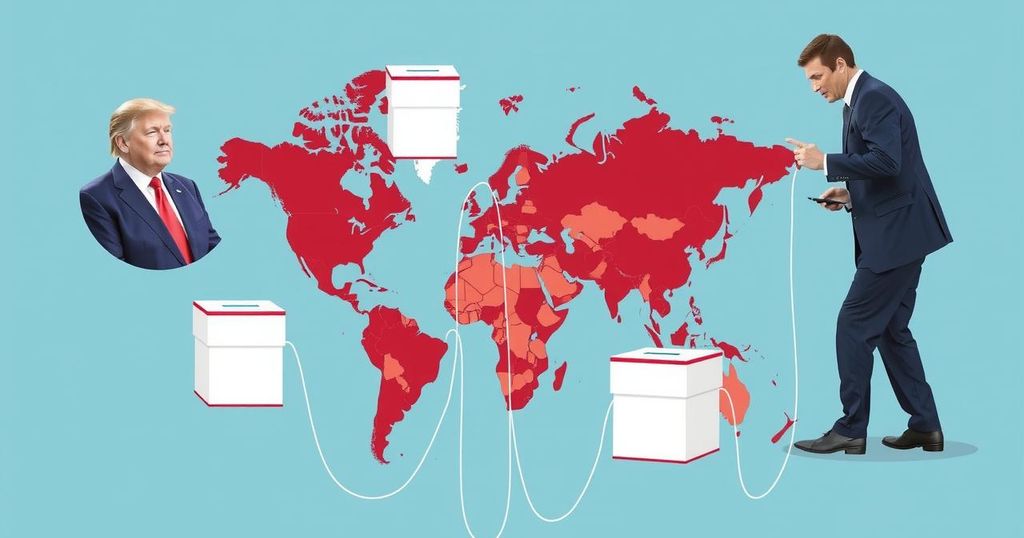In 2024, over 70 national elections took place globally, significantly impacting more than half the world’s population. A majority of incumbent parties lost ground, fueled by public dissatisfaction with economic conditions and governance. Major shifts were seen across political ideologies, with notable victories for both conservatives and left-leaning parties. The trends raise questions about future elections and the resilience of democratic systems.
The 2024 election cycle proved pivotal, with over 70 national elections conducted globally, significantly impacting more than half of the world’s population. Major democracies including India, the United States, Indonesia, and Bangladesh participated, alongside 27 European nations voting for a new European Parliament. Notably, the total number of ballots cast across these elections surpassed 1.6 billion, highlighting widespread voter engagement, as reported by the International Institute for Democracy and Electoral Assistance (International IDEA).
The 2024 elections were traditionally unfavorable for incumbents, as evidenced by a Financial Times article which noted that every incumbent party in developed nations did not increase their vote share, a trend unprecedented in nearly 120 years. In total, over 80% of democracies analyzed registered seat losses or diminished vote share by the ruling parties, signaling a resounding shift in voter sentiment against established political powers.
Results indicated a broader rejection of incumbents across the political spectrum, with conservatives securing wins in pivotal regions like the United States, where former President Donald Trump triumphed in battleground states. Concurrently, the left capitalized on this anti-incumbent sentiment, achieving significant victories in the United Kingdom and South Korea, illustrating a complex and dynamic political landscape.
In India, despite losing an outright parliamentary majority, Narendra Modi’s party retained power with the assistance of coalition allies. Similarly, incumbent governments in Japan, South Africa, and France experienced reduced support while reaffirming their hold on power. Contrastingly, less democratic nations appeared less affected by this global trend due to manipulated electoral processes; for example, President Kagame of Rwanda secured an almost identical result to prior elections.
Analysts attribute the incumbent losses predominantly to public dissatisfaction with economic conditions, particularly rising costs and challenges stemming from the pandemic. Notably, Mexico’s incumbent success stands out, as Claudia Sheinbaum was elected after voters expressed contentment with economic stability. Moreover, a Pew Research Center survey revealed a growing disillusionment with democratic governance itself, indicating a general alienation among citizens toward elected officials.
As future elections in 2025 approach, including significant polls in Argentina, Australia, and Canada, political analysts and voters alike remain vigilant. The upcoming year poses essential questions about the potential continuation of the anti-incumbent wave witnessed in 2024 or the emergence of new, influential factors in shaping electoral outcomes.
The 2024 election year marked a significant period of political upheaval globally. With over 70 national elections influencing billions, many incumbents faced unprecedented challenges, characterized by widespread public dissatisfaction. This election cycle was particularly notable for shifts in voter preference, impacting major economies and reflecting a growing disenchantment with traditional political systems. The emerging narrative suggests a pivotal moment for democracies worldwide as citizens increasingly demand accountability and responsiveness from their leaders.
The elections of 2024 underscored a historic rejection of incumbents across the globe, revealing profound dissatisfaction with political leadership and economic conditions. With a significant number of voters expressing their discontent through the ballot box, the political landscape is poised for transformation. As we move into 2025, the implications of this cycle will undoubtedly influence forthcoming elections and the future of democratic governance.
Original Source: www.voanews.com






